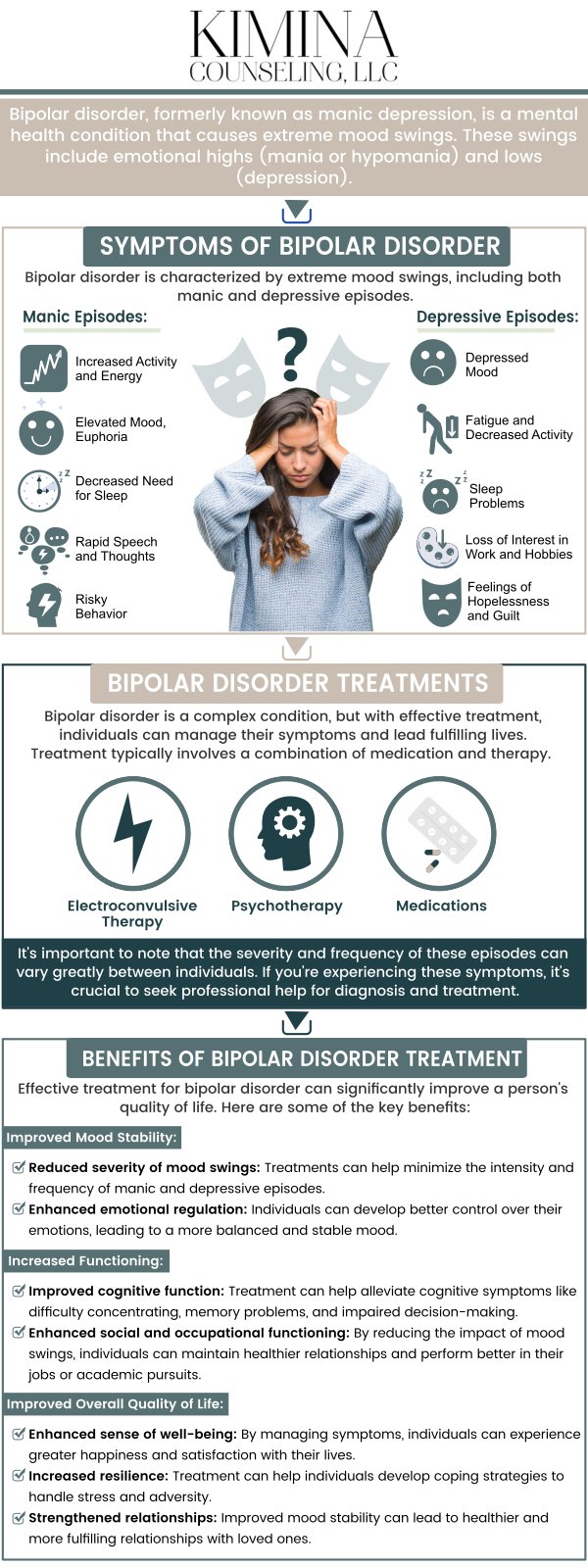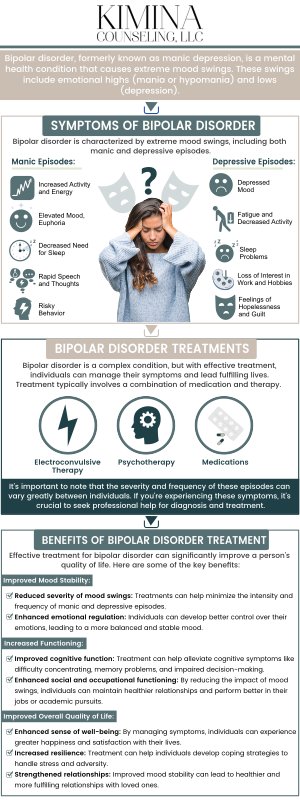Bipolar Disorder Therapist in Auburn, MA
Bipolar disorder is a mental health condition characterized by extreme mood swings, including manic episodes and depressive lows. At Kimina Counseling, LLC, our experienced therapists offer personalized therapy for individuals living with bipolar disorder. We focus on providing effective coping strategies, stabilizing mood swings, and improving overall emotional well-being. Our team works with you to develop a treatment plan that addresses your unique needs, helping you manage symptoms and live a balanced life. For more information, contact us or schedule an appointment online. We are conveniently located at 7 Midstate Drive, Suite 202, Auburn, MA 01501.


Table of Contents:
What is bipolar disorder?
What causes bipolar disorder?
What are the common symptoms of bipolar disorder?
What triggers a bipolar episode?
At Kimina Counseling, we understand that living with bipolar disorder can be challenging, not only because of the significant shifts in mood, energy, and activity levels, but also due to the impact these changes can have on daily life and relationships.
Bipolar disorder is a mental health condition characterized by extreme mood swings that include emotional highs (mania or hypomania) and lows (depression). During manic episodes, individuals may feel overly energetic, impulsive, or excessively optimistic, while depressive episodes are marked by feelings of sadness, hopelessness, and a lack of interest in activities. These mood swings can disrupt daily functioning and impact relationships, work, and overall well-being.
The exact cause of bipolar disorder is unknown, but it is thought to involve a combination of genetic, environmental, and neurobiological factors. The condition can affect people of all ages and is typically diagnosed in late adolescence or early adulthood. Managing bipolar disorder requires careful monitoring of symptoms and support to maintain stability.
At Kimina Counseling, we focus on helping individuals with bipolar disorder by building coping strategies, increasing self-awareness, and providing ongoing support so our patients can maintain balance and improve their quality of life.
We recognize that bipolar disorder is a complex mental health condition with no single cause. Current research shows that bipolar disorder arises from a unique combination of genetic, biological, and environmental factors for each individual.
Genetic Factors
Genetics is a major factor in bipolar disorder, which often runs in families. An individual has an increased risk of developing the condition if a close relative, such as a parent or sibling, is affected. However, no single gene is responsible; instead, multiple genes are thought to combine to increase a person’s vulnerability to the disorder. Having a genetic predisposition does not guarantee that someone will develop bipolar disorder, indicating that other factors are also involved.
Biological Factors
There is strong evidence that bipolar disorder is linked to differences in brain structure, chemistry, and function. The brains of people with the condition may show slight structural differences in areas that regulate mood, emotions, and impulse control. Additionally, imbalances in neurotransmitters—the brain’s chemical messengers like serotonin and dopamine—are thought to play a role. These imbalances may disrupt the communication pathways that control mood and energy levels.
Environmental Factors
Stressful life events and environmental triggers can also play a key role in the onset or relapse of bipolar episodes, especially in those with a genetic predisposition. These triggers can include:
⦁ Trauma: Experiencing severe stress or trauma in childhood or adulthood.
⦁ Major Life Changes: Significant events like the death of a loved one, a relationship breakdown, or a major physical illness.
⦁ Substance Use: The use of drugs or alcohol can trigger manic or depressive episodes.
⦁ Sleep Disruption: A significant and sudden change in sleep patterns can sometimes trigger an episode.
Because every individual’s experience with bipolar disorder is different, our team at Kimina Counseling is committed to providing personalized care. Our goal is to support you in understanding your condition and finding effective ways to manage it.
At Kimina Counseling, we understand that living with bipolar disorder can be challenging, both for individuals and their loved ones. Bipolar disorder is a mental health condition marked by significant shifts in mood, energy, and activity levels, often occurring in episodes known as manic and depressive phases.
Manic or Hypomanic Episodes:
Manic Episode:
A person may feel unusually happy, energetic, or “up.” Symptoms can include:
⦁ A decreased need for sleep, feeling rested after only a few hours.
⦁ Feeling a distorted sense of self-confidence or power.
⦁ Talking very fast or feeling a pressure to keep talking.
⦁ Having racing thoughts and being easily distracted.
⦁ Engaging in impulsive, risky behavior like spending sprees or reckless driving.
Depressive Episodes
Symptoms are similar to those of major depression. A person may feel sad, hopeless, or empty. Other common symptoms include:
⦁ A loss of interest or pleasure in almost all activities.
⦁ Feelings of worthlessness or excessive guilt.
⦁ Changes in appetite, leading to weight loss or gain.
⦁ Sleeping too much or too little.
⦁ Fatigue, a lack of energy, or mental sluggishness.
⦁ Inability to focus, recall details, or make decisions.
Our experienced team is trained to help you recognize these patterns and provide the support you need to manage your symptoms. We offer a safe, compassionate environment to explore your experiences and develop strategies for stability and well-being. Every person’s experience with bipolar disorder is unique, and our team is here to work with you on personalized treatment plans that may include therapy and coordination with other healthcare providers.
We understand that bipolar episodes can be triggered by a variety of factors, and these often differ for each individual. Common triggers for mood episodes often include significant life changes, such as the loss of a loved one, relationship difficulties, or major transitions like starting a new job or relocating. Every day stress—whether related to work, family, or personal challenges—can also contribute to the onset of an episode.
Disruptions in sleep patterns, such as staying up all night or having an irregular sleep schedule, are well-known to affect mood stability and may lead to episodes of mania or depression. Substance use, including alcohol or recreational drugs, can further increase the risk of triggering symptoms, as can certain medications that affect brain chemistry or sleep.
Physical illnesses, hormonal changes, or other medical conditions can also serve as catalysts. Interestingly, even positive events—such as weddings or the birth of a child—can sometimes be sufficiently stimulating to provoke an episode. It’s important to recognize that everyone’s sensitivities to these triggers are unique; what deeply affects one person may not impact another in the same way.
Our team at Kimina Counseling works closely with individuals to identify their specific triggers and develop personalized strategies for managing stress, maintaining healthy routines, and following a tailored treatment plan. We are here to support you in reducing the risk of bipolar episodes and improving your overall well-being. We also offer therapy for anxiety, trauma, ADHD, and personality disorders to support your mental health needs. For more information, contact us or schedule an appointment online. We are conveniently located at 7 Midstate Drive, Suite 202, Auburn, MA 01501. We serve patients from Auburn MA, North Oxford MA, Worcester MA, Grafton MA, South Worcester MA, Newton Square MA, and surrounding areas.

Check Out Our 5 Star Reviews


Additional Services You May Need
▸ Individual Therapy
▸ Couples Conseling
▸ Family Counseling
▸ EMDR Therapy
▸ Anxiety
▸ Depression
▸ Trauma
▸ Post-traumatic stress disorder (PTSD)
▸ Bipolar Disorder
▸ Serious Mental Illness (SMI)
▸ Parenting and Post-Partum
▸ LGBTQ+
▸ Phobias
▸ Grief
▸ Attachment Disorders
▸ Personality Disorders
▸ Obsessive Compulsive Disorder
▸ Substance Use Disorders
▸ Family Conflict
▸ Attention Deficit (ADHD)
▸ Behavioral Therapy
▸ Anger Management

Additional Services You May Need
▸ Individual Therapy
▸ Couples Conseling
▸ Family Counseling
▸ EMDR Therapy
▸ Anxiety
▸ Depression
▸ Trauma
▸ Post-traumatic stress disorder (PTSD)
▸ Bipolar Disorder
▸ Serious Mental Illness (SMI)
▸ Parenting and Post-Partum
▸ LGBTQ+
▸ Phobias
▸ Grief
▸ Attachment Disorders
▸ Personality Disorders
▸ Obsessive Compulsive Disorder
▸ Substance Use Disorders
▸ Family Conflict
▸ Attention Deficit (ADHD)
▸ Behavioral Therapy
▸ Anger Management






